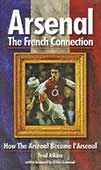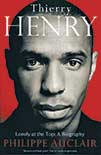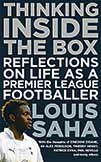Thierry Henry deserves another statue for his reaction to the Brendan Rodgers sacking news. https://t.co/KGIKMl4rap
— Miriti Murungi (@NutmegRadio) October 4, 2015
Search: ' Thierry Henry'
Stories
{youtube}wTf1sOl2IDg{/youtube}
 How the Arsenal became l’Arsenal
How the Arsenal became l’Arsenal
by Fred Atkins
GCR Books, £18.99
Reviewed by Damian Hall
From WSC 313 March 2013
There can’t be many football clubs that have a stronger connection to a foreign country than Arsenal do with France. Since Arsène Wenger took over, 23 French footballers have played for the Gunners – often in teams without an Englishman. Between September 10, 1996 and November 1, 2011 the club played only two competitive fixtures without a Frenchman in the team, both of which were experimental line-ups for relatively meaningless fixtures (and one included an unused French sub).
There’s a story to be told here and Fred Atkins is in a good position to tell it, having lived in France and studied at university in Strasbourg, the city where Wenger grew up and gained his oft-mentioned economics degree.
The book is logically divided into a chapter for each player and lengths wisely vary – you wouldn’t expect Patrick Vieira to get the same amount of coverage as Gilles Sunu. There’s a foreword by Gilles Grimandi, in which he self-deprecatingly confesses his one Arsenal goal was a mishit cross, but unfortunately there are no fresh interviews. Though tracking down all 23 men would have been a huge job, it means there’s little new here about the players’ times at Arsenal, bar occasional quotes translated from interviews with the French press.
The book’s interest comes largely from the players’ pre-Arsenal careers, such as the comical litany of bureaucratic errors by French football officials, one of which meant William Gallas couldn’t play first-team football for half a season at Marseille. No wonder his tantrums started long before his move to Arsenal. Many chapters are reminders that players’ foibles – Abou Diaby’s injuries, Mathieu Flamini’s perceived disloyalty – were there before they moved across the Channel. Some may enjoy the news that, while playing for Lorient against Bordeaux, Laurent Koscielny was once sent off for fouling future team-mate Marouane Chamakh and the obvious quips it encourages.
The Emmanuel Petit chapter stands out. His life has not been that of the average footballer: he’s struggled to deal with the death of his brother, depression, the USA 94 qualification failure (he played left-back in the defeat to Bulgaria) and periods of debauchery. Atkins also claims Petit drank and smoked throughout France 98. Perhaps more startlingly, after joining Barcelona, manager Lorenzo Serra Ferrer asked him what position he played. Petit almost joined Manchester United instead of Chelsea – and wishes he had.
However, Atkins’s tone is unashamedly parochial. There are puerile digs at Alex Ferguson, a tedious and paranoid rant about refereeing decisions and, apparently, Jacques Santini’s judgment should be questioned simply because he managed Tottenham, while crass speculation on Thierry Henry’s marriage breakdown belongs to the worst of the tabloid press.
Some bigger questions, too, go begging. Has Wenger systematically favoured French players over English players? If so, why? Should Le Prof still be recruiting heavily from Ligue 1 when the French national team are no longer pre-eminent – and when Alan Pardew seems better at it. And how has Wenger’s English seemingly got worse, “a little bit”, over the years?
 Lonely at the top:
A biography
Lonely at the top:
A biography
by Philippe Auclair
Macmillan, £17.99
Reviewed by David Stubbs
From WSC 310 December 2012
“I don’t recognise myself in the players I see today,” George Best said in his very last interview, conducted, as it happens, with Philippe Auclair himself. “There’s only one who excites me, and that is Thierry Henry. He’s not just a great footballer, he’s a showman, an entertainer.”
Henry, however, is not exactly in the Best tradition. He has both more and less about him than the ultimately ruined Manchester United superstar. Henry’s sheer quantity, as well as quality, of achievements at both league and international level dwarf Best’s but for all that he hasn’t quite blazed in the firmament in the same way. A lifelong teetotaller, he yields little or nothing in the way of a volatile private life, while his personality ranges from affable to aloof. For all those va-va-voom ads, he is simply not as scintillating a character off the field as he was on it in his prime. Maybe that’s why there has only been one full-length study of the player published in the UK – Oliver Derbyshire’s Thierry Henry: The amazing life of the greatest footballer on earth – a book as abysmal as its title, almost Piers Morganesque in the low it sets in Arsenal-related discourse.
Auclair admits not being drawn to Henry the way he was to Eric Cantona, his pre- vious subject in the acclaimed The Man Who Would Be King. However, Lonely At The Top is probably about as shrewd and in-depth a profile as we’re likely to get of Henry, who seems to have been moulded by the drive of his father, a highly influential figure in his life until he made a botched attempt to effect a transfer for his son to Real Madrid. The book tracks his development from a speedy but slight youngster reluctant to track back to the machine of panache he was at Arsenal. Auclair adds his own flourish with allusions to the likes of Philip Larkin and Gustave Flaubert which will raise the blood temperature of the compiler of Pseuds Corner but otherwise will only distract the most determinedly Philistine reader.
Auclair poses questions he’s not always able to answer, such as why Henry never seemed to get along with Zinedine Zidane and truly fulfil his potential at international level, or why Arsène Wenger is so beset at times with tactical ineptitude despite his success at Arsenal. Viewing matters from a French perspective, he regards Henry’s fateful handball against the Republic of Ireland as an unfortunate crowning moment in his career given the probably unfair antipathy it triggered against him, though Arsenal fans in particular would hardly see this as quite so defining of the player.
The access he has had, some forbidden to UK journalists, does yield insightful, incidental nuggets along the way: into the character of Emmanuel Petit, for instance, profoundly affected by a personal tragedy; Patrick Vieira’s excessively informative quote that the cheers of the Highbury throng gave him “a hard on”; as well as the partying habits of the French squad in the 2002 World Cup. This occasionally gives the impression that, fine and thoughtful as Lonely At The Top is, its author would secretly prefer to be writing about somebody or something else.
 Reflections on life as a Premier League footballer
Reflections on life as a Premier League footballer
by Louis Saha
Vision Sports, £14.99
Reviewed by Simon Hart
From WSC 308 October 2012
It was in the wake of the darkest hour of his life in football, when injury robbed him of the chance to play in the 2008 Champions League final, that Louis Saha began writing down the thoughts filling his troubled mind. Saha wept in his wife’s arms in the Luzhniki Stadium that night and would soon leave Manchester United for Everton, yet his writing became a crutch and eventually led to a book that is quite unlike your usual footballer’s offering.
“Eclectic” is how Saha describes his approach in the preface to Thinking Inside The Box, in which he combines memoir with musings on a range of football-related topics: media, money, racism, fans, music. And eclectic is a fitting word for a book that does not list medals won or goals scored but instead references Sir Trevor McDonald, Dominique Strauss-Kahn and the Leveson Inquiry, quotes Sean Penn, questions the French education system, praises the Bakewell tart, and cites statistics about CCTV cameras and anorexia sufferers.
It starts with Saha’s wry observation that his name means health in Arabic. “Me: plagued by injury,” he notes. It is certainly ironic that a player who acquired a reputation as injury-prone, even work-shy, should provide two poignant passages on the pain of missing matches. As well as the 2008 Champions League final, when his asthma meant he could not take the painkilling injection administered to Nemanja Vidic, he recalls his nausea after the booking that ruled him out of the 2006 World Cup final, adding lyrically: “My throbbing head was trapped in the referee’s pocket.”
Saha, with his evident love of the “paradise” of English football, denudes any notions about himself “not caring”. He does the same for the one-dimensional image of the footballer, writing with empathy about team-mates yet acknowledging their weaknesses. Wayne Rooney is capable of smashing a mobile phone in anger on the team bus yet also of answering every question in a quiz. Nicolas Anelka, a contemporary at the Clairefontaine national academy, had “tenacity, tinged with a touch of madness”. There is even understanding for young players who use prostitutes rather than risk kiss-and-tells.
The book’s French title, Du Quartier Aux Etoiles – “From the streets to the stars” is a rough translation – evokes his journey from a poor district of Paris under the guiding hand of his disciplinarian father, an immigrant from Guadeloupe, but while retelling his rise Saha provides a broader scope by including the thoughts of old team-mates like Patrice Evra, Thierry Henry, Zinédine Zidane and Phil Neville, and his manager at Old Trafford, Alex Ferguson.
Translated from French, the book has an idiosyncratic style – “bro” and “lol” crop up a lot while a chapter on money introduces an imagined “Mam’zelle Starfucker” and “Mr Bling”. Saha’s approach to money betrays an ambivalence – he lists his expensive cars yet worries his children are spoiled. Meanwhile, he gives his wife Aurélie a chapter to offer a WAG’s perspective, laments the demise of traditional values and yet declares that total honesty is the wrong approach with a woman “because what you say goes in one ear and comes out through her mouth, with added ammo”.
This ambivalence is a virtue of a book that asks questions while seeking no easy answers. It is not something you heard every week at Goodison Park, but full marks to Saha for trying.